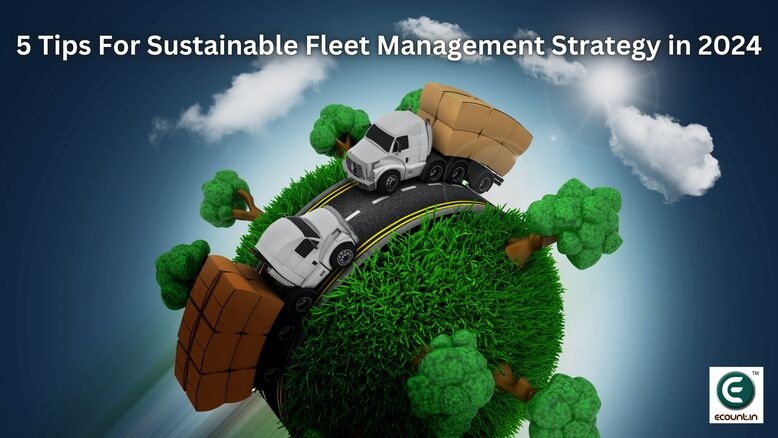5 Tips For Sustainable Fleet Management Strategy in 2024
15-07-2024

In today's fast-paced world, there is no denying that technological advancement has reached new heights and will continue to advance. However, there are many challenges associated with this development. These problems are not only limited to the environment but also affect finances and promote colonial challenges.
Fleet management plays a major part in the emission of CO2 and environmental degradation. It has become a huge issue and can not be overlooked easily. This is why the need for practicing sustainability in fleet management has never been more critical. We at E-Count, are encouraging businesses to take a step ahead and be part of these positive initiatives for shaping a better and sustainable future.
To implement effective strategies, proper guidance, and attention is essential. In this article, we have mentioned all the necessary tips to follow for sustainable fleet management.
What is Sustainable Fleet Management?
Sustainable fleet management is the approach of fleet management practices to be done with great care while paying attention to environment and businesses financial conditions. In simple words, it is an operation for keeping a balance between these two fleet business challenges to achieve the best possible monetary and ethical output.
Over the decades, we have witnessed significant industrial development globally. Despite improved living standards and technological advancements, these have come with substantial negative impacts on the environment. A 2017 study by the EU revealed that road transport alone contributes approximately 21% of total carbon dioxide emissions. Whether for this reason or others, there is a pressing need to normalize sustainable fleet management worldwide. As we strive towards sustainability, adopting an effective fleet management system can greatly reduce wasteful time and fuel consumption in transportation. It also reduces the possibility of human errors and enhances route optimization.
Effective Tips for Sustainable Fleet Management Strategy
A proper fleet management strategy is fundamental to implementing sustainability in the business. Therefore, here we have shared 5 useful tips for it:
1. Adapt Technology
Utilizing technology could be the game changer for fleet management. The best fleet management software gives access to real-time vehicle tracking, fuel consumption, and other important functions as well. Many repetitive and redundant tasks will be automated, giving the efficient time for the critical operations that lead business to success. The system can help in scheduling route planning and optimizing, reducing the travel distance by suggesting a shorter route. This not only saves time but also minimizes fuel consumption while allowing more deliveries to take place as well.
2. Promote Electric and Hybrid Transport Vehicles
Many fleet businesses know the value of sustainable practices and have already started utilizing EV and hybrid transport vehicles for transport. These vehicles produce fewer emissions and have lower maintenance costs as compared to internal combustion engine vehicles (ICEV). In recent years, the government of India has been continuously making efforts to promote electric vehicles by offering subsidy schemes.
Before putting these vehicles on the road, managers should evaluate the fleet routes and make plans accordingly. If the route is in an urban area, and of a shorter distance with availability of charging distance, then EV could be the best option. But in case, the delivery location is far, the route demands to cover rough roads, and unavailability of charging stations, hybrid vehicles are the better option.
3. Preventive Maintenance and Vehicle Inspection
Vehicles that have inefficient engines or worn-out parts, may consume more fuel, be prone to breakdowns, or also lead to accidents. By taking necessary precautions and scheduling regular vehicle inspections, these problems can be solved even before they occur. Managers can use truck fleet management software to get alerts for regular checks and inspections. Maintaining vehicles and equipment properly will automatically reduce carbon emissions extending the lifespan of the vehicles.
4. Implementing a Sustainable Procurement Policy
Whenever opting for a purchase of vehicles and their parts, it becomes critical for managers to verify that they align with the environmental and social responsibility (ESR) standards. Purchase managers can source the products or vehicles from reliable suppliers and whenever demand rises, try to buy from the same. This step will help in maintaining sustainability and also supporting the responsible supplier.
5. Encourage Eco-Friendly Driving Practices
Not everyone drives the vehicle in an efficient way. Some of the drivers might like to drive harshly without knowing it may affect the environment and the business in a longer period. It is important that all drivers are aware about the efficient driving practices. Enabling regular training sessions to encourage and foster eco-friendly driving habits. The sessions that could be included in the training are smooth acceleration, maintaining stable speeds and turning the engine off whenever idle time is above 2 minutes.
Summary
By adapting to technology, promoting EV and hybrid vehicles, helding regular inspection, implementing sustainable procurement policy, and encouraging eco-friendly driving practices, any fleet business can gain financial benefits as well as proudly contribute to the sustainable fleet management practices.